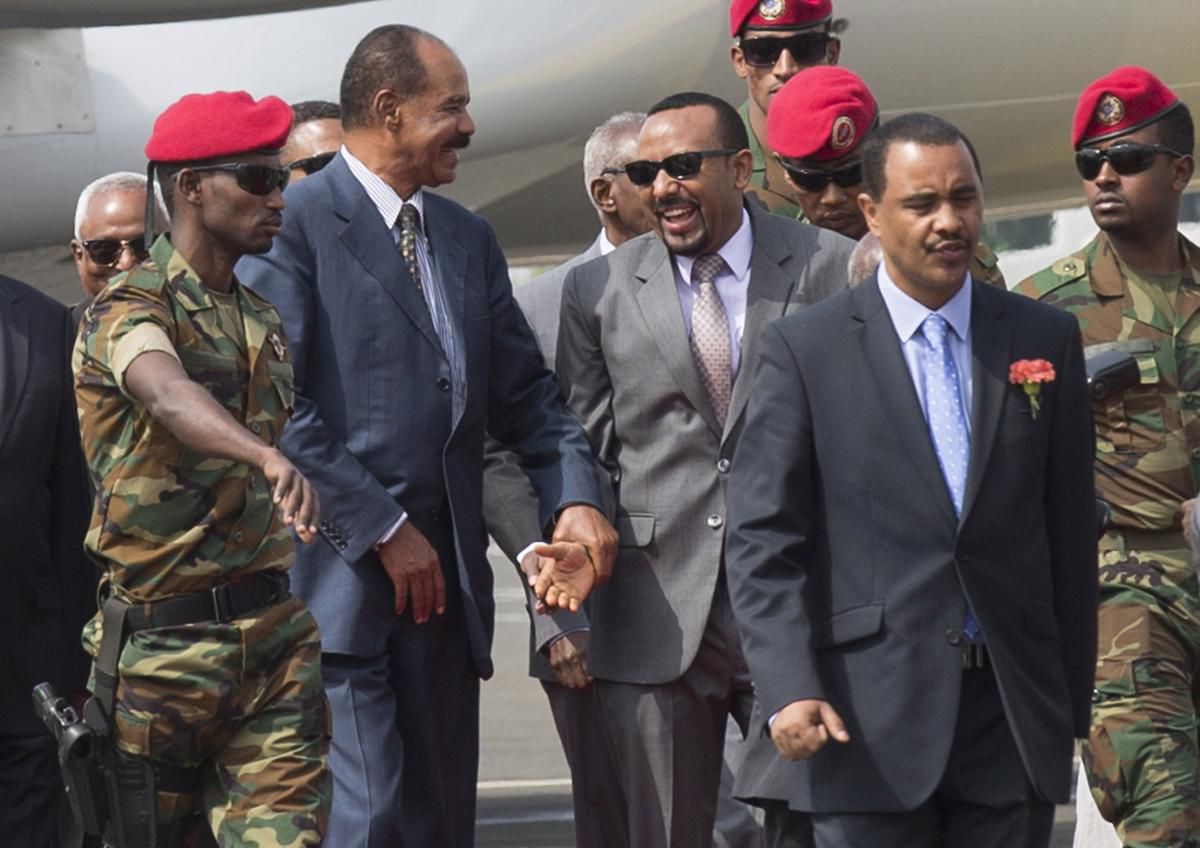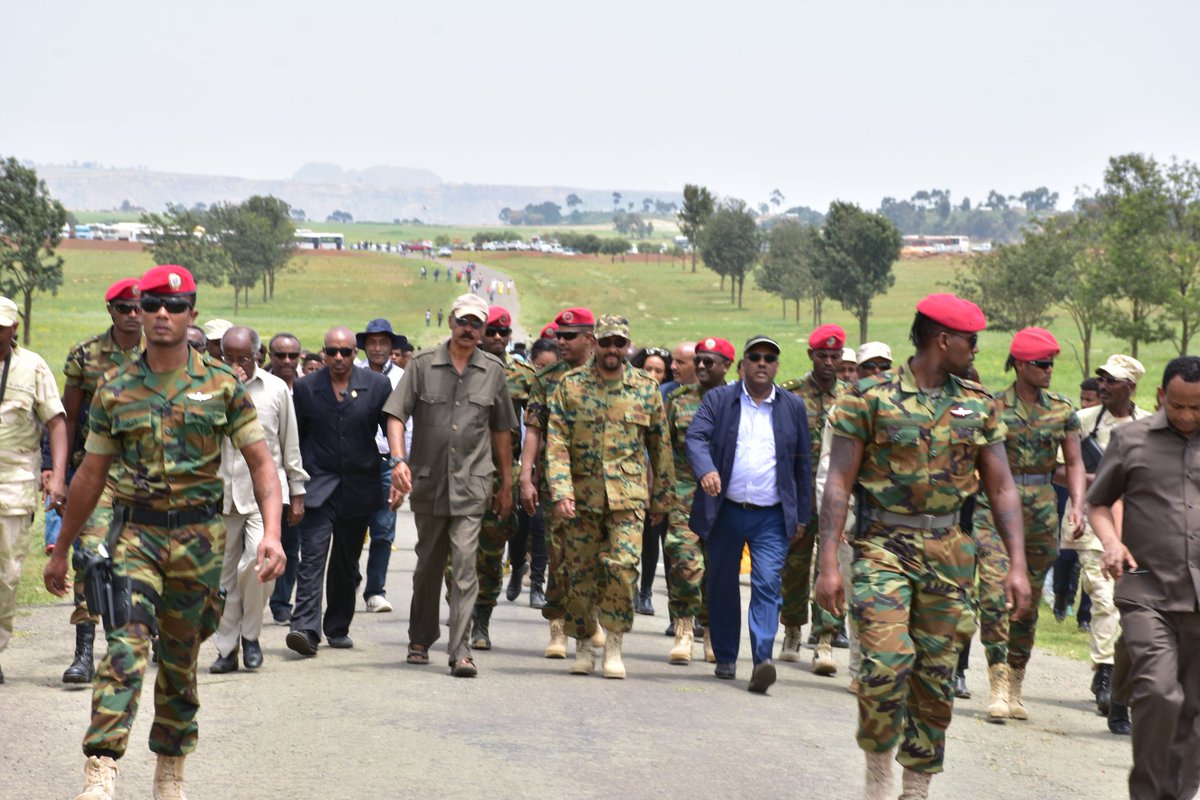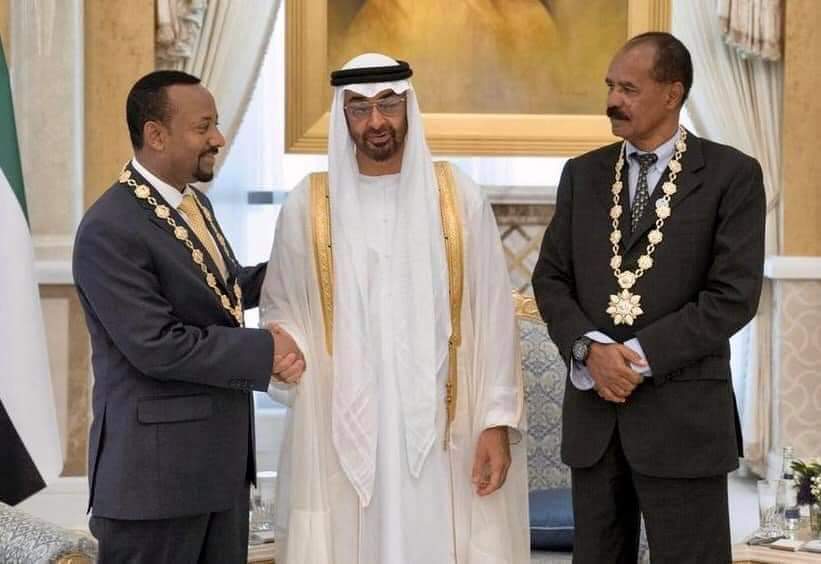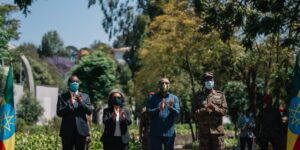The Abiy Ahmed and Isaias Afwerki alliance is not occurring in an ideological vacuum; it is not merely due to their dislike of, vengeance against, or power tussle with TPLF. The ideology that brings them together is currently underway in Abiy’s reform: it departs from the promised multinational federalism.
By GETU TERESSA
On November 28, Ethiopian authorities announced the fall of Mekele, the Tigray region capital, and declared that the war against the Tigray People’s Liberation Front (TPLF) is over, nearly four weeks after launching the offensive.
Prime Minister Abiy Ahmed, the winner of the 2019 Nobel Peace Prize, launched the war on November 4 as the world attention remained transfixed on the 2020 U.S. presidential election results. He alleged that the TPLF crossed the “last red line” by attacking a federal military base and attempting to “steal” military armaments. TPLF dominated Ethiopia’s politics, economy, and security for nearly three decades until Abiy took office in 2018.
The conflict continued to escalate, raising fears of a multiethnic conflagration and widespread security crisis in the volatile Horn of Africa region. Regional analysts have expressed concerns that the war in Tigray may go out of control, spreading to the rest of Ethiopia and becoming a catastrophic civil war. There has also been a mounting worry of neighboring countries getting drawn into the conflict.
This fear has been realized. The Tigray security forces have accused Eritrean involvement in the war and launched retaliatory attacks, firing missiles into Asmara, Eritrea’s capital. Both Asmara and Addis Ababa deny Eritrean involvement, but the media could not independently verify their claims. However, eyewitnesses have testified to the presence of Eritrean troops on Tigray northern border assisting the Ethiopian military. Ethiopia admits that its soldiers who retreated to Eritrea have regrouped on Eritrean soil and returned to Ethiopia to re-engage Tigrayan fighters. In his parliamentary address on November 30, Abiy thanked Eritrea for its support in the conflict.
TPLF and the ruling People’s Front for Democracy and Justice (PFDJ) in Eritrea have a long and turbulent relationship. Eritrea’s involvement in the Ethiopian conflict could, therefore, be deeply destabilizing for the region. The Eritrean regime interest in Ethiopia, and the Horn of Africa in general, is critical to understanding the full breadth of the complex drivers of the conflict in Ethiopia.
The EPLF-TPLF love-hate relationship
The mutual antipathy between TPLF and PFDJ, formerly the Eritrean People’s Liberation Front (EPLF), dating back to the 1970s, reached its climax when these one-time brothers-in-arms dragged their countries into one of Africa’s deadliest wars in 1998. The border war ended in 2000 with the Algiers Agreement and the establishment of the Eritrea-Ethiopia Boundary Commission. The commission awarded the contested town of Badme to Eritrea in its “final and binding” rule in 2002. Still, it was met by Ethiopia setting preconditions for further negotiations, which Eritrea refused to accept until the ruling is respected.
Eritrean President Isaias Afwerki was deeply angered by what he considered a betrayal. The EPLF trained and armed TPLF fighters when the group was established in 1974. In 1991, EPLF played a crucial role in helping the TPLF control political power in Ethiopia. The border war set alight an inextinguishable flame of animosity that has haunted TPLF and the Eritrean regime ever since. The two nations remained in a “no war, no peace” stalemate until 2018.
Abiy took office in 2018 after mass protests forced the resignation of Hailemariam Desalegn, the chairman of the ruling Ethiopian People’s Revolutionary Democratic Front (EPRDF) at the time. TPLF lost its preeminence in the EPRDF coalition and national politics.
Shortly after ascending to power, Abiy announced that Ethiopia was ready to accept the Algiers Treaty terms fully. The two leaders subsequently signed a Joint Declaration of Peace and Friendship on July 9, 2018. The rapprochement paid immediate dividends for both: Abiy won the Nobel Peace Prize, particularly for his “decisive initiative to resolve the border conflict with neighboring Eritrea.” And a range of international sanctions imposed on Eritrea in 2009, amid claims of Eritrean support for Al-Shabab in Somalia (denied by Eritrea), was lifted. The UN Human Rights Council accepted Eritrea despite repeated accusations by the same body of large-scale human rights abuses. Ethiopia lent diplomatic support for both initiatives.
The Abiy’s administration and TPLF have been locked in a bitter political and ideological dispute. Since Abiy’s rapprochement with Isaias, Eritrean leaders have not shied away publicly siding with Abiy in the escalating tug-of-war with TPLF. Afwerki had said that he was following the political tensions in Ethiopia closely and “readying to react accordingly.”
The Anti-TPLF Alliance
After the signing of the declaration, what ensued was a very informal and personalized friendship between Abiy and Afwerki with little institutionalised progress in relations between the two countries. Abiy used his clout as a Nobel Laureate to gain external legitimacy and lobby to ease Afwerki’s diplomatic isolation. Afwerki is also allegedly using Abiy to extend his repression against Eritreans who escaped mandatory and indefinite military service.
Afwerki now sees the possibility of positioning himself as a significant player in the geopolitics of the Horn. His adventure has thus begun in Ethiopia. And Abiy welcomes, in fact, invites it. They both have a common enemy: TPLF.
TPLF has long alleged that Eritrea and Abiy’s hostile government were planning to “encircle” the Tigray region. Abiy and Afwerki accuse TPLF of hampering the implementation of the peace accord and progress on border demarcation. Afwerki’s regime declines the Tigrayan leaderships’ engagement in the international border discussions, which they feel is strictly between the federal government (from which TPLF has been sidelined) and Eritrea. At the core of Afwerki’s refusal also lies resentment over the autonomy of TPLF, which until now remained in the Tigray Region owing to what Afwerki calls the “mess of ethnic federalism”—the decentralization of power.
Thus, Abiy and Afwerki’s alliance is not occurring in an ideological vacuum; it is not merely due to their dislike of, vengeance against, or power tussle with TPLF. The ideology that brings them together is currently underway in Abiy’s reform: it departs from the promised multinational federalism. TPLF and many ethnonational groups in Ethiopia’s south and east, thus, fear it will undermine their right to self-government.
Afwerki’s Aversion to Federalism
The ideological root informing Afwerki’s position on Ethiopia lies in the drastically different forms of nationalism pursued by the EPLF and other ethno nationalist groups in Ethiopia long before Eritrea’s independence in 1991. The EPLF has pursued a form of nationalism that subordinates sub-national identities and emphasizes the shared colonial history of Eritrean ethnolinguistic communities. By contrast, TPLF, like many Ethiopians from the student movements of the1960s and 70s, defined Ethiopia as a prison of nationalities, forcefully dominated and held together by the Amhara. It sought the right to self-determination of “nations and nationalities” as a political remedy.
Nevertheless, during the guerrilla days, TPLF and the EPLF put aside these ideological differences to face a common enemy, the communist regime of Mengistu Hailemariam (the Derg). TPLF created the EPRDF, an alliance of ethnically-based parties, in 1989 as a platform to seize political power in Ethiopia. In a coordinated battle and dual victory in 1991, EPLF forces took control of Asmara while TPLF fighters, with EPLF soldiers fighting alongside them, captured Addis Ababa.
TPLF, led by Meles Zenawi, and other political forces, convened in Addis Ababa at the dawn of victory. They inscribed the principle of self-determination up to secession in Article 39 of the 1994 Constitution. This pact was lauded for saving Ethiopia from disintegration by promising intrastate autonomy via the restructuring of Ethiopia into a federation of nine ethnolinguistic states.
Meanwhile, Eritreans overwhelmingly voted for independence from Ethiopia in a referendum held in 1993, ushering in the culmination of their 30-year liberation war and the beginning of 30 years of Afwerki’s rule, with no constitution, parliament, or elections.![]()
The TPLF and EPLF ideological disagreements remained subdued, if not entirely forgotten, after defeating the Derg, but Eritrea’s regime declared war on Ethiopia’s federalism and constitution after the 1998–2000 border war.
In the early 2000s, Eritrea’s Ministry of Information launched a magazine called One Ethiopia, purportedly to “promote Ethiopia’s unity.” Eritrea’s Foreign Ministry made official statements condemning what it dubbed “ethnic-based” politics and the “ethnic-based” federal administration in Ethiopia.
When Abiy came to power, the Eritrean regime’s anti-federalism rhetoric returned with a vengeance. Most recently, in February 2020, Afwerki declared “game over” for Ethiopia’s “ethnic federalism,” which he alleges was promoted by a “narrow clique,” namely, TPLF members. Regarding allegations of interference in Ethiopia’s internal affairs, especially over what he considered Abiy’s reform on “ethnic federalism,” he said:
We don’t want to fully interfere in deciphering the poisons of ethnic federalism. That is their internal issue. However, we won’t be silent until it victimizes Eritrea, and that is why we are working together with Abiy Ahmed . . . In our history, the nation causing the main threat for Eritrea is Ethiopia. We have direct interests in Ethiopia… We are advising Ethiopians to follow the best path for nation-building.
In essence, the issue of Ethiopia’s multinational federalism and the constitution is not only the product of the deep-rooted hatred between TPLF and the EPLF and the need for vengeance against TPLF, but it is ideological and tied to Afwerki’s ambitions for regional hegemony and its implication for his idea of nation-building.
The Fear of Self-Determination
Like Ethiopia, Eritrea is a multiethnic state. Some of the ethnic groups are transnational, straddling two or three East African countries. Afwerki’s government promotes a nation-building process by subordinating subnational identities. Similar to the mushrooming quest for statehood in Ethiopia’s South, the Eritrean government faces self-rule and self-determination demands, particularly from the Afars—a transnational community inhabiting Eritrea, Ethiopia, and Djibouti.
Therefore, the possible diffusion of the spirit enshrined under Article 39 of the Ethiopian Constitution is contrary to Afwerki’s nation-building project. To exacerbate this fear, some Ethiopian nationalists, while accepting Eritrea’s independence as a fait accompli, advocate that Eritrea’s Red Sea Afars have the right to self-determination and join their Ethiopian cousins. It is not clear to what extent Afeworki’s opposition to ethnonational self-determination emanates from the fear that it could bring together the Tigrinya speakers of Eritrea (60 percent of the Eritrean population) with their Tigrayan cousins in Tigray to form a common homeland, an idea TPLF toyed with early on.
Afwerki’s Regional Ambitions
Afwerki had a strong influence on Ethiopia’s internal affairs in the 1990s, dictating its politics and procuring favorable trade deals built on mutual transactional relationships that failed to materialize into a formal and enduring nation-to-nation friendship. In other words, Afwerki was at the top of the Ethiopian political-administrative pyramid: the EPLF influenced the TPLF government, which in turn controlled the Ethiopian people through surrogate ethnic parties in the EPRDF coalition. TPLF, in return, obtained the EPLF’s political and military support to maintain its hegemony after eliminating alternative political forces such as the Oromo Liberation Front from the political process. The period also saw a substantial northward flow of resources from Ethiopia’s South.
Two factors made Afwerki’s outsized influence possible in the 1990s: the TPLF-led government’s dependency on the Eritrean regime for managing domestic politics and the centralization of power, despite the multinational federalism arrangement, by TPLF, which enabled the EPLF to deal directly with the all-controlling center. The decentralization of power in Ethiopia by granting greater autonomy to regions or states would mean that Afwerki’s administration would have limited opportunity to leverage the central government in Addis Ababa.
Since the 1960s, Ethiopia’s instability has been deeply intertwined with the unanswered question of nations and nationalities for self-rule. There is no sure way to keep Ethiopia in a perpetual political and security crisis other than by denying the fulfillment of this age-old question of genuine self-rule—a fact Afwerki certainly understands. This is at the core of the crisis in Tigray and Oromia. Afwerki’s policy, therefore, favors a regime in Ethiopia that centralises power and becomes dependent on it for managing the inevitable internal political crisis.
Abiy’s radical reform that departs from the EPRDF politics presented Afewerki with a geopolitical advantage. The dissolution of the EPRDF and the formation of a single centralised Prosperity Party (PP) in December 2019 unveiled a seismic structural change to the ethnonational configuration of the EPRDF that mirrors the federal structure. It also expunged the principles of self-determination and the commitment to multinational federalism from the PP political program. Abiy has vowed to dismantle the existing multinational federation and replace it with what he has called “true federalism,” without specifying what that would look like or outlining the process he would undertake to make such a radical rearrangement to the constitutional order.
The crackdown on strong proponents of Ethiopia’s multinational federalism in Oromia with the arrest of one of the most popular political figures, Jawar Mohammed, and other Oromo political leaders, are all indications that Abiy intends to settle political differences using violence. As such, the war in Tigray is a more violent ideological battle extending from the one that has engulfed Oromia for nearly two years.
Afwerki strongly backs Abiy’s ideological orientation and actions.
An Unholy Alliance
The right-wing Ethiopian nationalists and Amhara nationalists, who have become the core of Abiy’s political base, are elated by Afwerki’s position on Ethiopia. Some are former rebels hosted by Eritrea during their struggle against the TPLF-led regime in Addis Ababa. Abiy’s supporters also include retired political and military officials from the Derg regime. They campaigned to persuade Abiy to enlist Afwerki’s military assistance to war with TPLF. Thus, Abiy has become the nexus whereby Amhara ultranationalists, right-wing Ethiopian nationalists, and the Afwerki regime converge, goading him into the war of attrition. However, this alliance is forged by narrow, short-term interests. It is also emblematic of a cycle of vendetta-driven politics that has placed—and continues to place—the region in a state of perpetual conflict.
The anti-federalist sentiment that animates right-wing Ethiopian and Amhara nationalists—whose political underpinning is restorative nostalgia about the “lost” mythical glory of a centralized Imperial Ethiopia—can not be disentangled from the grievance of loss of Ethiopia’s access to the sea. They continue to romanticize that either Eritrea will eventually “reunite” with its “motherland” or Ethiopia will reclaim its historical, legal, and even biblical ordained ‘right’ to the Red Sea.
While speaking of Ethiopia’s long, if controversial, history of statehood and resiliency, Abiy himself proclaimed that Ethiopia will only get bigger by reclaiming territories separated from it, a clear allusion to Eritrea. This sentiment had in fact brought together Meles’ government and right-wing Ethiopian nationalist at the start of the Ethiopia-Eritrea border war in 1998—a rapprochement described as “really dangerous” by a former high-ranking Pentagon official who feared that nationalists would goad Meles into all-out war hoping to get the sea coast back. Anti-multinational federalism is part of an ideological “package deal” that firmly resents Eritrea’s independence.
The existence of this sentiment is not unknown to Eritrea’s leadership. Still, it appears that it is a risk they are willing to take by aligning themselves with these groups to exact vengeance against their archenemy TPLF and the multinational federalism they fear and loathe. Perhaps they are also overconfident about “forecasting” a favorable long-term geopolitical outcome from Ethiopia’s crisis.
Afwerki’s current alignment with Abiy and right-wing Ethiopians will likely plant the seeds of future conflict, similar to the alliance between Meles and Afwerki. Any dispute in a future encounter between the two countries would be akin to Eritrea’s 30-year independence war.
On the other hand, Abiy and right-wing Ethiopian nationalists are willing to risk Ethiopia’s internal cohesion and create a situation in which the country becomes dependent on Afwerki’s regime to settle its internal political and ideological disputes. Ethiopia appears to be already in such a state. Afwerki’s patronage will likely continue as long as Abiy’s government deals with the political turmoil and armed conflicts in Tigray and Oromia. While keeping formidable political forces in prison, there is now a focus to hold an election to give future changes to the constitutional order and the federal system a façade of credibility. The U.S. Institute of Peace recommends against “any change by force or fiat either to Ethiopia’s constitutional order or to its internal or external borders” and urges the international community to hold accountable foreign states that “exacerbate tensions or provide material support to any of the parties to the conflict.”
Afwerki’s paradigm of engagement with Ethiopia, beyond vengeance, is thus founded on the pursuit of regional power by weakening Ethiopia. As such, the politics and policies Afwerki pursues have inherent contradictions for the kind of Ethiopia both pro-and anti-federalists want to see, and they do not advance either the long-term interests of the Eritrean people or the security of the region.
- Lideta Sub City Woreda celebrated International Women’s Day - 11th March 2024
- THE AMHARA FANO FREEDOM FIGHTERS - 13th February 2024
- GREAT VICTORY FROM SHOWA GOVERNORATE - 12th February 2024




